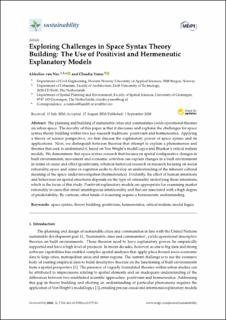| dc.contributor.author | van Nes, Akkelies | |
| dc.contributor.author | Yamu, Claudia | |
| dc.date.accessioned | 2021-03-30T12:08:51Z | |
| dc.date.available | 2021-03-30T12:08:51Z | |
| dc.date.created | 2020-12-01T14:19:48Z | |
| dc.date.issued | 2020 | |
| dc.identifier.citation | van Nes, A., & Yamu, C. (2020). Exploring Challenges in Space Syntax Theory Building: The Use of Positivist and Hermeneutic Explanatory Models. Sustainability, 12(17). | en_US |
| dc.identifier.issn | 2071-1050 | |
| dc.identifier.uri | https://hdl.handle.net/11250/2736126 | |
| dc.description.abstract | The planning and building of sustainable cities and communities yields operational theories on urban space. The novelty of this paper is that it discusses and explores the challenges for space syntax theory building within two key research traditions: positivism and hermeneutics. Applying a theory of science perspective, we first discuss the explanatory power of space syntax and its applications. Next, we distinguish between theories that attempt to explain a phenomenon and theories that seek to understand it, based on Von Wright’s modal logics and Bhaskar’s critical realism models. We demonstrate that space syntax research that focuses on spatial configurative changes in built environments, movement and economic activities can explain changes in a built environment in terms of cause and effect (positivism), whereas historical research or research focusing on social rationality, space and crime or cognition seeks to develop an understanding of the inherent cultural meaning of the space under investigation (hermeneutics). Evidently, the effect of human intentions and behaviour on spatial structures depends on the type of rationality underlying these intentions, which is the focus of this study. Positivist explanatory models are appropriate for examining market rationality in cases that entail unambiguous intentionality and that are associated with a high degree of predictability. By contrast, other kinds of reasoning require a hermeneutic understanding. | en_US |
| dc.language.iso | eng | en_US |
| dc.publisher | MDPI | en_US |
| dc.rights | Navngivelse 4.0 Internasjonal | * |
| dc.rights.uri | http://creativecommons.org/licenses/by/4.0/deed.no | * |
| dc.title | Exploring challenges in Space Syntax theory building: The use of positivist and hermeneutic explanatory models | en_US |
| dc.type | Journal article | en_US |
| dc.type | Peer reviewed | en_US |
| dc.description.version | publishedVersion | en_US |
| dc.rights.holder | © 2020 by the authors. | en_US |
| dc.source.volume | 12 | en_US |
| dc.source.journal | Sustainability | en_US |
| dc.source.issue | 17 | en_US |
| dc.identifier.doi | 10.3390/su12177133 | |
| dc.identifier.cristin | 1854854 | |
| dc.source.articlenumber | 7133 | en_US |
| cristin.ispublished | true | |
| cristin.fulltext | original | |
| cristin.qualitycode | 1 | |

